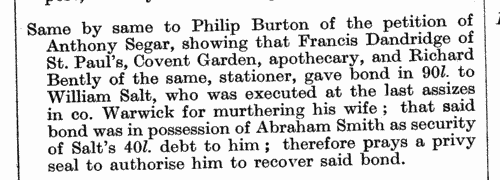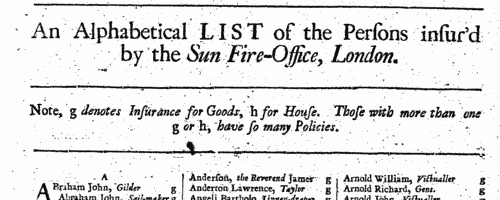Add this eBook to your basket to receive access to all 87 records. Our indexes include entries for the spelling hutchin. In the period you have requested, we have the following 87 records (displaying 11 to 20): These sample scans are from the original record. You will get scans of the full pages or articles where the surname you searched for has been found. Your web browser may prevent the sample windows from opening; in this case please change your browser settings to allow pop-up windows from this site. Treasury and Customs Records
(1685-1688)
Government accounts, with details of income and expenditure in Britain, America and the colonies
| Sample scan, click to enlarge

| Lancashire and Cheshire Marriage Licences
(1680-1691)
Licences for intended marriages in Chester archdeaconry, which covered Cheshire and Lancashire south of the Ribble (by far the most populous part of that county) | Sample scan, click to enlarge

| House of Lords Proceedings
(1692-1693)
Private bills dealing with divorce, disputed and entailed estates: petitions, reports and commissions: naturalisation proceedings.
| Sample scan, click to enlarge

| Hertfordshire Sessions
(1581-1700)
Incidents from the Hertfordshire Sessions Rolls. These cover a wide range of criminal and civil business for the county, with presentments, petitions, and recognizances to appear as witnesses: many of the records concern the county authorities dealing with regulation of alehouses, religious conventicles, absence from church, highways, poaching, profanation of the Sabbath, exercising trades without due apprenticeship &c. Unlike the Sessions Books, the decisions of the justices are not recorded on the rolls, which serve more as a record of evidence and allegations. Where the date of a roll is given with an asterisk, it indicates that that particular document was not then in the county muniments, but in the archives of the Marquess of Salisbury (whose ancestors had served as Custos Rotulorum) at Hatfield House. This is a calendar of abstracts of extracts: it is by no means a completely comprehensive record of the surviving Hertfordshire sessions rolls of the period, but coverage is good. | Sample scan, click to enlarge

| Hertfordshire Sessions
(1658-1700)
Incidents from the Hertfordshire Sessions Books and Minute Books. These cover a wide range of criminal and civil business for the county: numerically, the the most cases (759) concerned not attending church; presentments about repairs to roads and bridges (247); unlicensed and disorderly alehouses (226); assault (156); badgers, higlers, &c., trading without licence (142); and trading without due apprenticeship (117). This calendar gives abstracts of all entries in the Sessions Books and Minute Books for Hertfordshire sessions for the period. | Sample scan, click to enlarge

| Persons Insured by the Sun Fire Office, London
(1714)
This list of the persons insured by the Sun Fire Office, London, gives full name (surname first), occupation (in italics), and the letter g (for goods) or h (for house) indicating the nature of their policy. Those with more than one g or h, have so many policies. An appendix lists those entered since, and omitted in printing the list, which was published in instalments from February to March 1714. | Sample scan, click to enlarge

|  Apprentices registered at Leicester
(1713-1715) Apprentices registered at Leicester
(1713-1715)
Apprenticeship indentures and clerks' articles were subject to a 6d or 12d per pound stamp duty: the registers of the payments usually give the master's trade, address, and occupation, and the apprentice's father's name and address, as well as details of the date and length of the apprenticeship. There are central registers for collections of the stamp duty in London, as well as returns from collectors in the provinces. These collectors generally received duty just from their own county, but sometimes from further afield. July 1713 to April 1715. (The sample entry shown on this scan is taken from a Norfolk return) | Sample scan, click to enlarge

|  Apprentices registered at Warrington in Lancashire
(1713-1715) Apprentices registered at Warrington in Lancashire
(1713-1715)
Apprenticeship indentures and clerks' articles were subject to a 6d or 12d per pound stamp duty: the registers of the payments usually give the master's trade, address, and occupation, and the apprentice's father's name and address, as well as details of the date and length of the apprenticeship. There are central registers for collections of the stamp duty in London, as well as returns from collectors in the provinces. These collectors generally received duty just from their own county, but sometimes from further afield. July 1713 to April 1715. (The sample entry shown on this scan is taken from a Norfolk return) | Sample scan, click to enlarge

|  Apprentices registered at Norwich in Norfolk
(1715-1717) Apprentices registered at Norwich in Norfolk
(1715-1717)
Apprenticeship indentures and clerks' articles were subject to a 6d or 12d per pound stamp duty: the registers of the payments usually give the master's trade, address, and occupation, and the apprentice's father's name and address, as well as details of the date and length of the apprenticeship. There are central registers for collections of the stamp duty in London, as well as returns from collectors in the provinces. These collectors generally received duty just from their own county, but sometimes from further afield. Because of the delay before some collectors made their returns, this register includes indentures and articles from as early as 1714. (The sample entry shown on this scan is taken from a Norfolk return) | Sample scan, click to enlarge

|  Masters and Apprentices
(1719) Masters and Apprentices
(1719)
Apprenticeship indentures and clerks' articles were subject to a 6d or 12d per pound stamp duty: the registers of the payments usually give the master's trade, address, and occupation, and the apprentice's father's name and address, as well as details of the date and length of the apprenticeship. 22 June to 31 December 1719. | Sample scan, click to enlarge

|
Research your ancestry, family history, genealogy and one-name study by direct access to original records and archives indexed by surname.
|












